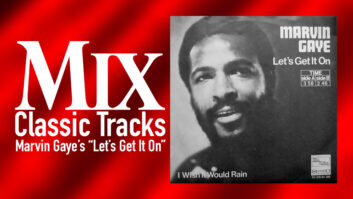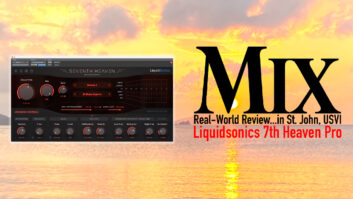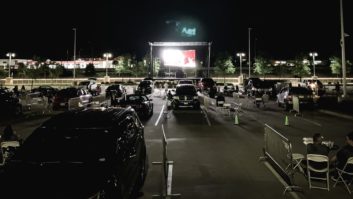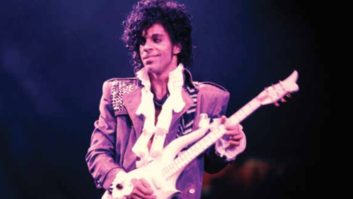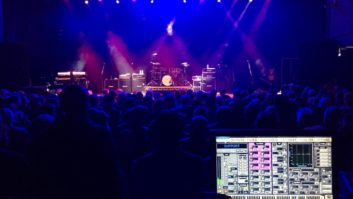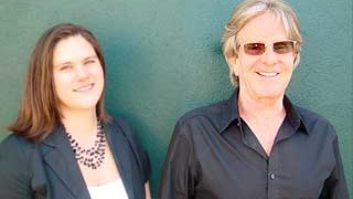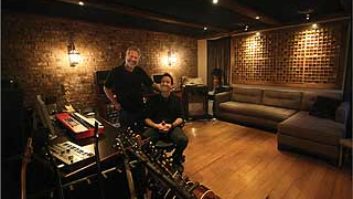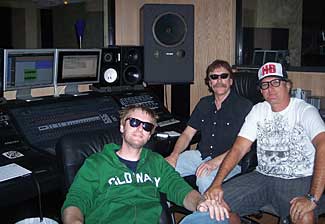
From left: engineer Jessie Wright, owner Frank Wright and producer Ronnie
Photo: Nate Criel
On a hazy late-summer afternoon, I pull into the parking lot of California Sound Studios in Lake Forest, 60 miles south of my ‘hood. For some time to come, I’ll associate this place with a stop-and-go, two-hour schlep down the always-jammed I-5, but for musicians based south of Hollywood, the facility is a potential godsend.
Compared to Hollywood and the San Fernando Valley, the area is underserved, with a handful of state-of-the-art studios and a number of entities in which recording is a sideline at best. California Sound’s modern, 3,500-square-foot space houses two studio/control room suites pairing Digidesign worksurfaces (an ICON Control24 in A, an 003 in B) with an array of high-end outboard gear and mics. Throw in an experienced staff and competitive rates, and it would appear that the facility has a lot going for it relative to the local competition.
Veteran producer/guitar player Frank Wright founded California Sound in 2001, relocating to this space in a recently constructed business park two years ago. Yes, he expanded even as a lot of SoCal studios were downsizing. But Orange County is a world unto itself, with its own music and its own set of realities.
This is a family operation in the most literal sense: Frank Wright is the house producer; one son, Jessie, is chief engineer, while the other, Nathan, handles the business for the studio and Fontana-distributed incubator label Wright Records. The newest addition to the team is Newport Beach-based producer/keyboard player Ronnie King, who handles projects from hip-hop to reggae to pop.
Born and raised on Chicago’s South Side, Wright played society gigs and Rush Street clubs with future members of the group Chicago, and started coming to L.A. in the mid-’60s. During one of his visits, the youngster was befriended by Sonny Bono, who hired him as a guitarist in Sonny & Cher’s backing band. In 1978, Wright and his wife, JoAnn, decided to leave the Windy City for SoCal. “Me and the wife looked around and decided there was no place closer to heaven than Orange County,” he recalls, “so we moved here, and we’ve been here ever since.” Wright averaged 500 miles a week making the round trip to Hollywood, where he worked as a session guitarist and learned to engineer at the side of the late Brian Ingoldsby, who headed ABC’s Recording division.
After more than two decades of commuting, Wright decided to open the original California Sound. “I figured, what’s a better environment to teach the kids this business than to have our own studio and throw ’em into it? I did a lot of the work myself with the guys’ help.” In the early days, the studio was modestly appointed, but the family drew enough business to make intermittent upgrades, Wright making up a wish list of his favorite analog gear and dispatching Jessie Wright to locate it. The experience served as an apprenticeship for Jessie Wright, who became adept at making use of his acquisitions, both vintage (United Audio 6076, Neumann U87) and contemporary (Avalon 737, PreSonus M80, AKG 414 stereo matched set), while developing his Pro Tools chops.
A lot of the studio’s business comes from veteran musicians who live in the area. “It saves them a trip — and I know that trip very well,” says Wright with a laugh. Among those who’ve made use of California Sound are Snoop Dogg, Warren G, OutKast’s Sleepy Brown and 98 Degrees’ Jeff Timmons, along with members of Korn, Boys II Men and Iron Butterfly. At the other end of the spectrum are the acts being developed under the Wright Records nameplate, including Long Beach-based hip-hop crew the Indovizualz, reggae group Cyrious & D-Lux out of Laguna Beach, dance outfit Speaker Junkies, Christian rappers Priesthood and Huntington Beach punk group Lifeline.
It was a 2008 Lifeline project that brought King to California Sound. “They asked me to produce a song for them,” he says, “and I started getting calls from bands in the area about this ‘really cool studio up in Lake Forest.’ That worked for me, living in Newport and wanting to cut down on the drive time. Plus, I’m used to working with professionals and having a home studio doesn’t really fit my needs. So that’s what brought me here. I did a couple records here, and the boys were like, ‘Hey, let’s do more.’”
Says Wright, “One of Ronnie’s first comments when he came here was, ‘I love it, the group loves it, you got a great-lookin’ studio that’s kept up and the washrooms are clean.’ Part of it is just keeping the place attractive.”
King’s dream is to lure bigger area acts like the Offspring, No Doubt and Mariah Carey — all of whom he’s recorded albums with — into the studio to record. Wright’s dream is more ambitious: to update the Sam Phillips/Sun Records model of the stand-alone studio/indie label for the 21st century.
“Since I started the studio,” Wright says, “I had the idea rolling around in the back of my mind to find talent and bring them along to the point where we can start selling records with them and then send them off to the major labels. But now the majors have pulled back on doing their own A&R, and what I foresee for the future is everything coming out of a house like this and being sold through indie distribution. Luckily, we got in on the ground floor.” In the meantime, he adds, “We just have to keep everything going and keep the lights on. So far, so good.”
Send L.A. news to Bud Scoppa at
bs7777@aol.com.
